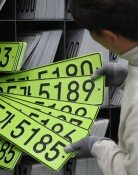Freeloaders in national healthcare system
Freeloaders in national healthcare system
Posted October. 20, 2018 07:24,
Updated October. 20, 2018 07:24
A man in his 30s owns a BMW and a Ferrari. The market price of the two cars combined is about 386 million won. This man, however, does not pay a penny for national healthcare insurance as he is registered as a dependent of his wife. There are over 15,000 national health care “free-loaders” across the country.
According to the data submitted to Rep. Jeong Chun-sook of the Democratic Party of Korea, as many as 15,401 people registered as a dependent under the National Health Insurance program owned a car worth over 40 million won as of July 2018. Among them, 12,958 people, or 84 percent, owned an imported car. The number of dependents, who do not pay a penny for national health insurance program, accounted for a whopping 39.4 percent of the entire subscribers in 2017.
The government has converted the dependents whose income and assets are more than a certain amount into local subscribers since July this year. The assets, however, do not include rent and cars. There is a growing criticism that the current system is unfair as local subscribers pay their health insurance premium based on their assets that include land, house, monthly rent, “jeonse” (lump-sum rental system) deposit, and cars.
Furthermore, the health insurance premium calculation system that is based on appraised land value fails to reflect the rising house prices. According to Rep. Kim Sang-hee of the Democratic Party of Korea, if appraised land value is increased uniformly by 30 percent, the health insurance premium for people living in Seoul would increase by 17.31 percent. On the other hand, subscribers living in Incheon, where housing price is relatively lower than that of Seoul, would have to pay 38.47 percent more premiums on average. Subscribers living in Daejeon would have to pay 37.0 percent more.
When appraised land value rises, the current health insurance calculation system causes “reverse discrimination” as premiums increase less in places where house price is high and more in places where house price is relatively low. This paradox results from the current unfair system, where the premiums are imposed on the basis of levels of assets. Subscribers with low assets are divided into many levels, causing a slight increase in assets to a hike in premiums whereas subscribers with high assets are divided into fewer levels.
Chul-Jung Kim tnf@donga.com
Headline News
- N. Korea launches cyberattacks on S. Korea's defense companies
- Major university hospital professors consider a day off each week
- Italy suffers from fiscal deficits from ‘Super Bonus’ scheme
- Inter Milan secures 20th Serie A title, surpassing AC Milan
- Ruling and opposition prioritize spending amid tax revenue shortfalls







